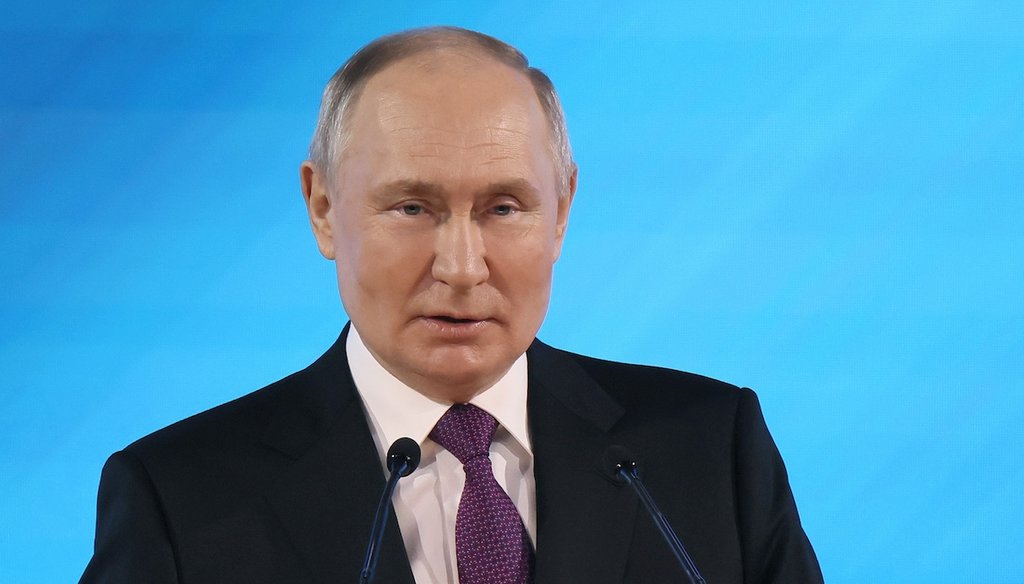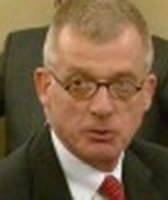Stand up for the facts!
Our only agenda is to publish the truth so you can be an informed participant in democracy.
We need your help.
I would like to contribute

Russian President Vladmiri Putin’s lies about Ukraine were the 2022 Lie of the Year. (AP)
Wait a minute … that can’t be true.
Through the year, we at PolitiFact say that a lot, as we fact-check false statements from the campaign trail, the Oval Office and social media. Although we say mostly that things are false or misleading, we save "lie" for Lie of the Year — the mendacious statement, or statements, that undermined the truth most significantly in the previous 12 calendar months.
For 2023, the distinction goes to the conspiracy theories of Robert F. Kennedy Jr.’s presidential campaign.
Here’s a look at PolitiFact’s Lies of the Year going back to its 2009 debut.
2022: Russian President Vladimir Putin, for his statements that obfuscated truths about the war in Ukraine
Putin deployed a highly sophisticated propaganda machine — hundreds of websites, state-run media, social media channels, fake fact-checking and oppressive censorship laws — to wage an unprovoked war and join history’s most brutal authoritarians. Putin disseminated ruthless falsehoods — that Ukraine was committing genocide or under neo-Nazis’ leadership, for example — to co-opt Russian citizens whose family members would be sent to fight a war, kill others and perhaps die themselves.
2021:Lies about the Jan. 6 Capitol attack and its significance
On Jan. 6, 2021, after then-U.S. President Donald Trump lost the 2020 presidential election, a mob of his supporters attacked the U.S. Capitol in Washington, D.C. Although live news footage and videos from participants provided inescapable evidence of what happened, claims that Jan. 6 was an antifa operation, a false flag, a tourist visit or an uneventful, forgettable day persisted and proliferated throughout the year.
2020: Coronavirus downplay and denial
Lies about COVID-19 infected America in 2020, as conspiracy theories and misinformation, including that new coronavirus was overblown, and maybe a hoax, spread. These lies hampered the U.S. response to the coronavirus pandemic and the worst of them were not just damaging, but deadly.
2019: Trump’s claim that whistleblower got Ukraine call "almost completely wrong"
A whistleblower raised concerns that Trump’s actions leading up to a July 2019 phone call the then-president had with Ukrainian President Volodymyr Zelenskyy amounted to 2020 presidential election interference. Trump, incensed, worked to discredit the whistleblower, but the complaint sparked months of investigation and Trump’s first impeachment in the House. More than 80 times, Trump insisted the whistleblower’s account was incorrect, "total fiction" and "almost completely wrong." But the record of the call as released by the White House combined with under-oath testimony from career diplomats and other officials validate the whistleblower’s account.
2018: Online smear machine tries to take down Parkland students
After 17 people were viciously gunned down at a Parkland, Florida, high school, students advocated for action against gun violence. Then came the lies, as the students were called "crisis actors" and worse. With polarization high and bipartisanship scarce, the attacks on the Parkland students sparked shared outrage in nearly all political corners.
2017: Russian election interference is a "made-up story"
Trump continually asserted that Russia’s meddling in the 2016 election was fake news, a hoax or made up, despite widespread, bipartisan evidence to the contrary. Classified and public reports and U.S. intelligence agencies said Russian President Vladimir Putin ordered actions to interfere with the election.
2016: Fake news
Although conspiracy theories have long been part of America’s political conversation, they surged online in 2016. Fake news found a willing enabler in then-Republican presidential candidate Trump, who repeated and legitimized fabricated reports. We defined fake news as fabricated information that was manipulated to look as if it were credible news reporting for easy online spreading.
2015: The campaign misstatements of Trump
From dubious accounts of his own record and words to "thousands and thousands" of people cheering in New Jersey on Sept. 11, 2001, Trump’s inaccurate statements in 2015 exhibited boldness and a disregard for the truth previously unseen in a presidential candidate. By December 2015, PolitiFact had rated 76% of Trump’s claims Mostly False, False or Pants on Fire. No other politician had clocked more falsehoods on our Truth-O-Meter, and our only real contenders for Lie of the Year were Trump’s.
2014: Exaggerations about Ebola
In 2014, there were just two Ebola-related deaths in the United States, yet exaggerated claims from politicians and pundits stoked fear of the disease nationwide. Claims included that Ebola was easy to catch, that immigrants illegally in the country may have been carrying the virus and that it was all part of a government or corporate conspiracy.
2013: President Barack Obama: "If you like your health care plan, you can keep it."
Obama and other Democrats claimed this when touting the Affordable Care Act. but reducing the complicated health care law to a sound bite proved treacherous. In fall 2013, people started to receive insurance cancellation notices, proving the statement was wrong. Worsening matters, Obama and his team suggested the claim had been misunderstood. To quell the political uproar, Obama issued a rare presidential apology.
2012: Mitt Romney campaign's ad on Jeeps made in China
When Romney ran for president in 2012, his presidential campaign launched an ad claiming that Jeep was pulling its plants out of Ohio, a critical swing state, and moving production to China. But the Ohio Jeep plants weren’t going anywhere; the moves in China were to expand into the Chinese auto market. Negative press coverage deluged Romney’s campaign; he lost in Ohio, a key battleground state, and then the election.
2011: "Republicans voted to end Medicare."
Democrats absorbed two years of Republicans’ false charges about the 2010 Affordable Care Act. Then, they turned the tables, slamming House Republicans for voting for a cost-cutting budget resolution from Rep. Paul Ryan, R-Wis. Democrats claimed that voting for this resolution amounted to voting to end Medicare, but Ryan never proposed ending Medicare. He wanted to bring more private insurers into the program. Democrats later altered their talking point to say Republicans wanted to end Medicare "as we know it."
2010: "A government takeover of health care"
As the Affordable Care Act moved toward enactment, Republicans repeated that the law was a government takeover of health care, though it wasn’t. "Government takeover" connotes a European approach in which the government owns the hospitals and the doctors are public employees. The Affordable Care Act, by contrast, relied largely on the free market and in no way nationalized the country’s health system.
2009: Sarah Palin and "death panels"
Former Alaska Gov. and 2008 vice presidential candidate Palin had PolitiFact’s very first Lie of the Year — that the Affordable Care Act included "death panels." The idea of government boards that would supposedly determine whether seniors and people with disabilities were worthy of care, was wholly fictional. The law didn’t, and doesn’t, call for death panels. But in 2009, about 30% of the public believed the health care law did include them.
RELATED: PolitiFact’s 2023 Lie of the Year: Robert F. Kennedy Jr.’s campaign of conspiracy theories
RELATED: PolitiFact readers’ pick for 2023 Lie of the Year
RELATED: Robert F. Kennedy Jr. sued PolitiFact’s owner in 2020 over flu vaccine fact-check
Our Sources
Please see links in story.





































